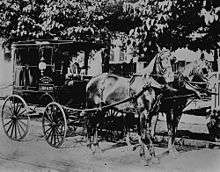Mary Lemist Titcomb

Mary Lemist Titcomb (1852–1932) was a librarian.
Biography
Mary Lemist Titcomb was born in Farmington, New Hampshire in 1852. Titcomb learned of the profession of librarian in a church newsletter, and she took an interest in becoming one.[1]
At the Concord Public Library in Massachusetts, Titcomb began as an apprentice librarian. She applied for a job in Vermont at the Rutland Public Library where she worked for twelve years. Titcomb was also elected as secretary to the first Vermont Library Commission. Titcomb moved on to the Washington County Free Library [2] in Maryland, which opened in 1901. This was only the second county library in the United States.[1]
Titcomb developed an early American bookmobile.[3] As librarian at the Washington County, Maryland Free Library, Titcomb was concerned that the library was not reaching all the people it could. The annual report for 1902 lists "23 branches", collections of 50 books in a case placed in stores and post offices around the county.[4] Realizing this still failed to reach all of the county's rural residents, in 1905 the Washington County Free Library provided one of the first American book wagons to residents by taking the books directly to their homes in remote parts of the county.[5]
Titcomb also recognized the need for training of library personnel. The Washington County Free Library began an official training class in 1924. Other United State libraries offered training, but none of these libraries were as small as the Washington County Free Library. The class that Titcomb offered was comparable to the classes offered at library schools of the time. The training classes at Titcomb’s library continued until 1931.[1] Titcomb died in 1932 at the age of 80. In 1990, Mary Titcomb was inducted into the Maryland Women's Hall of Fame.[6]
Quotes
“Would not a Library Wagon, the outward and visible signs of the service for which the Library stood, do much more in cementing friendship? Would the upkeep of the wagon after the first cost be much more than the present method? Is not Washington County with its good roads especially well adapted for testing an experiment of this kind, for the geography of the County is such that it could be comfortably covered by well planned routes? ...
The first wagon, when finished with shelves on the outside and a place for storage of cases in the center resembled somewhat a cross between a grocer's delivery wagon and the tin peddlers cart of by gone New England days. Filled with an attractive collection of books and drawn by two horses, with Mr. Thomas the janitor both holding the reins and dispensing the books, it started on its travels in April 1905." from The Story of the Washington County Free Library (1931)
"Any account of this first Book Wagon work...would be incomplete without the statement that this method of rural library extension has been adopted in many states in the Union, and that new book wagons are being put in operation each year."
References
- 1 2 3 Maryland State Archives at www.msa.md.govmsa/educ/exhibits/womenshall/html/titcomb.html Maryland Women's Hall of Fame] at www.msa.md.gov, accessed August 2009
- ↑ Washington County Free Library
- ↑ "The first county bookmobile in the US, Western Maryland Regional Library". whilbr.org.
- ↑ Washington County Free Library. First Annual Report for the Year ending October 1, 1902.
- ↑ Maryland State Archives. "Maryland Women's Hall of Fame". Washington County Free Library.
- ↑ msa.md.gov
Bibliography/webliography
- Titcomb, M. L. (1931). Story of the Washington County Free Library. Hagerstown, MD: Press of Hagerstown Bookbinding & Print. Co
- Titcomb, M. L. (1909). A County Library and On the trail of the book wagon; two papers read at the meeting of the American Library Association. Hagerstown, MD: Herald Pub. Co.
- Titcomb, M. L. & Mason, M. (1921). Book Wagons: the county library with rural book delivery. Madison, WI: Wisconsin Free Library commission.
